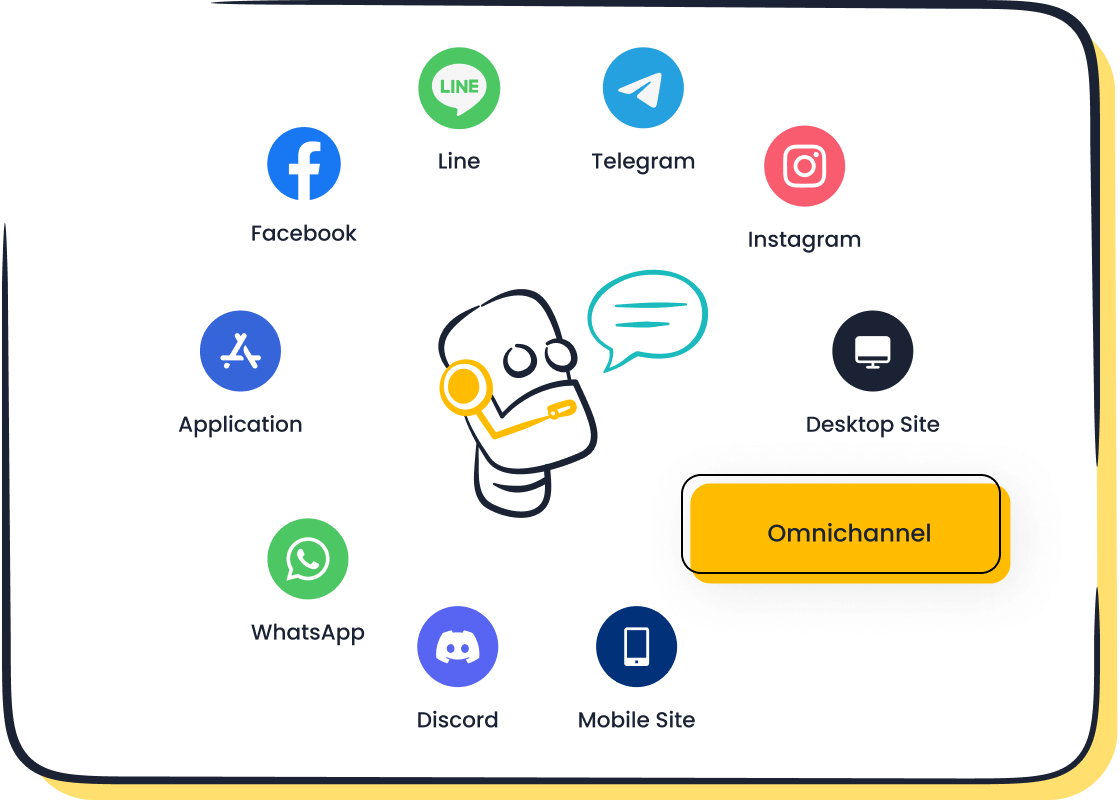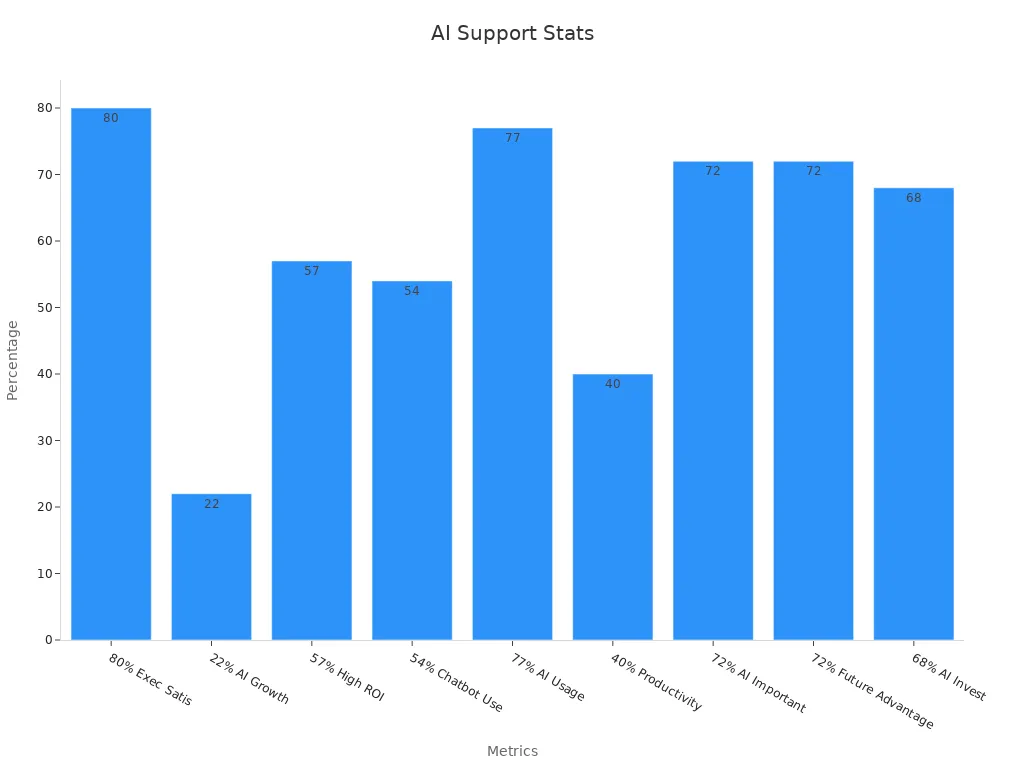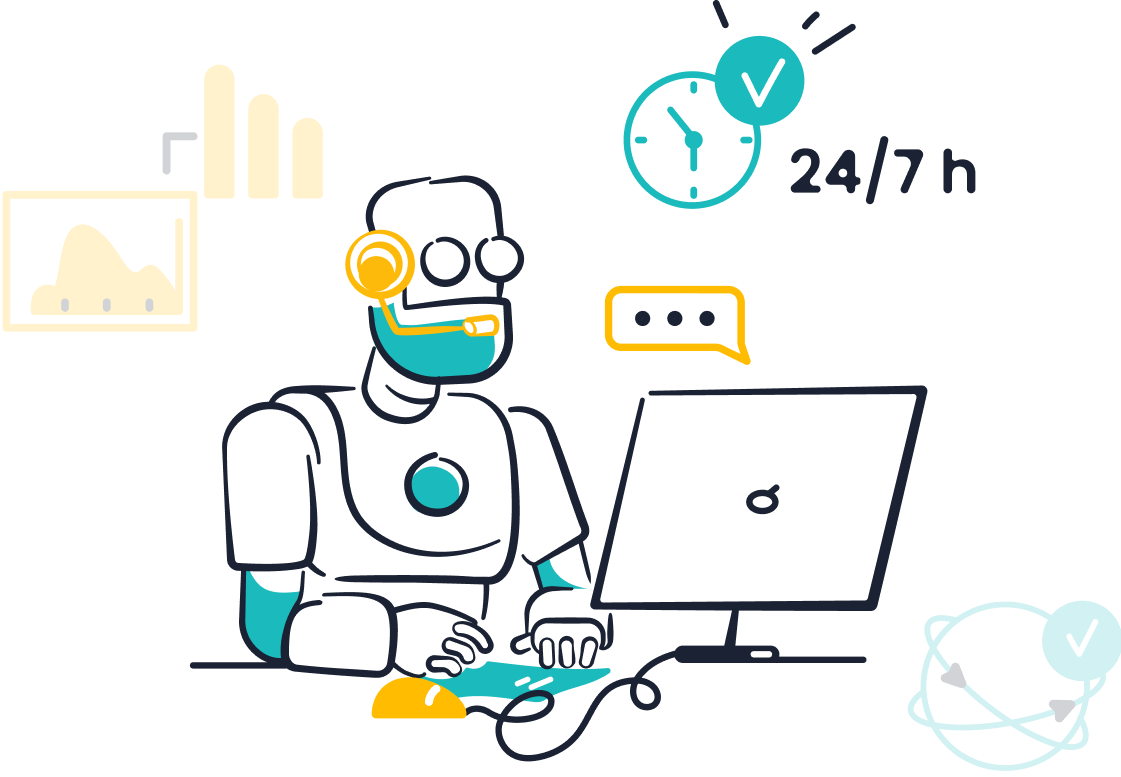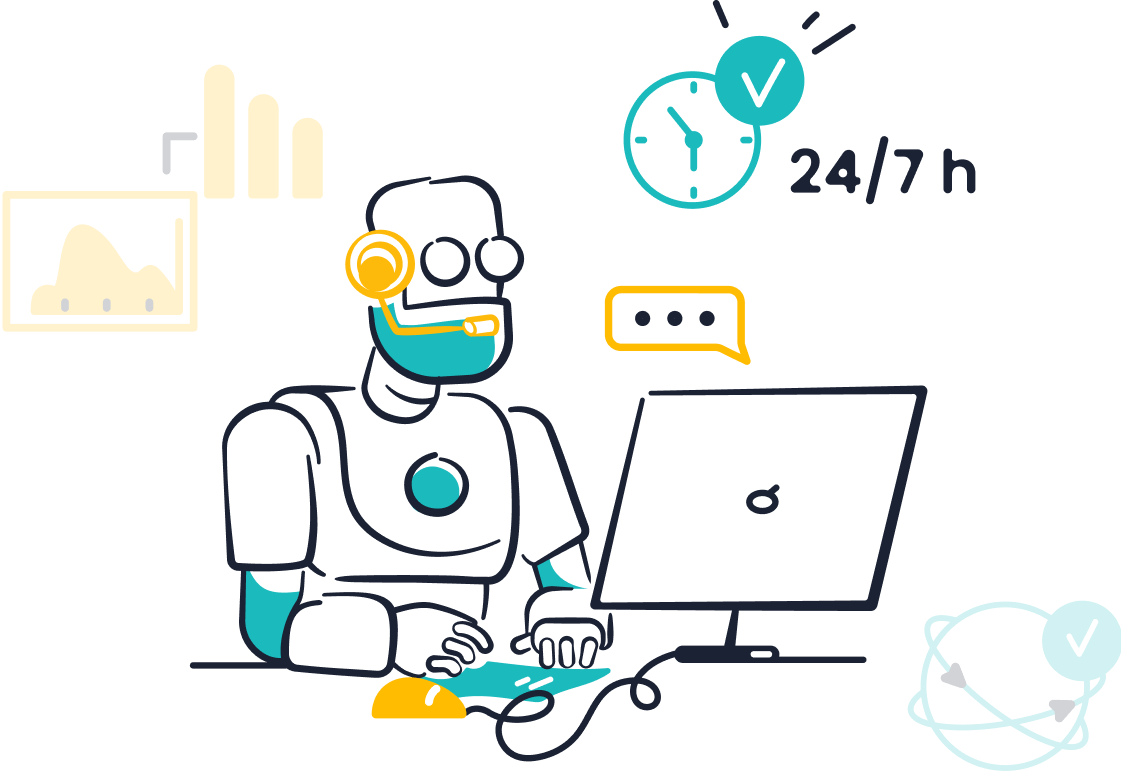Understanding Automated Customer Support for Businesses

Automated customer support uses technology to handle customer inquiries without human intervention. It plays a vital role in modern businesses by streamlining operations and meeting customer expectations for quick responses. Studies show that 70% of customers prefer self-service options, making automation essential for managing routine tasks efficiently. Additionally, automation reduces long wait times, a leading cause of poor customer experiences.
Sobot, a leader in this field, offers advanced solutions like AI-powered chatbots and omnichannel platforms. These tools help businesses provide 24/7 support, cut costs, and improve customer satisfaction. With Sobot, you can enhance service efficiency while focusing on complex customer needs.
What Is Automated Customer Support?
Definition and Core Features
Automated customer support refers to the use of technology to manage customer interactions without direct human involvement. It leverages tools like AI chatbots, voice assistants, and ticketing systems to handle routine inquiries, provide instant responses, and streamline workflows. This approach ensures faster resolutions and reduces the workload on human agents.

Key features of automated customer support include 24/7 availability, multilingual capabilities, and integration across multiple channels. For instance, Sobot's AI-powered chatbot operates round the clock, offering self-service options in various languages. It also integrates seamlessly with platforms like WhatsApp and SMS, ensuring customers can reach you through their preferred channels. These features not only enhance efficiency but also improve customer satisfaction.
Key Technologies in Automated Customer Service
Automated customer service relies on advanced technologies to deliver seamless experiences. Artificial intelligence (AI) plays a pivotal role by enabling chatbots to understand and respond to customer queries. Machine learning (ML) allows these systems to improve over time, while natural language processing (NLP) ensures accurate interpretation of customer intent.
According to Gartner, 54% of support teams now use chatbots or AI platforms. Additionally, AI can boost productivity by 40%, as reported by Techjury. Sobot's omnichannel solution exemplifies this by integrating AI-driven automation with a unified workspace, enabling agents to focus on complex issues while routine tasks are automated.

Examples of Automated Customer Support in Action
Real-world applications highlight the effectiveness of automated customer support. For example, Hyundai implemented AI automation to enhance customer service, resulting in 1,000 car sales and a 10% retail conversion rate. Similarly, Pelago used generative AI-powered conversational agents to onboard 5,000 users and achieve a 50% deflection rate within six weeks.
Sobot's collaboration with OPPO showcases the transformative impact of automation. By integrating Sobot's chatbot and ticketing system, OPPO achieved an 83% chatbot resolution rate and a 94% positive feedback rate. This partnership also reduced knowledge base maintenance efforts by 90%, demonstrating how automation can optimize operations and elevate customer satisfaction.
How Does Automated Customer Support Work?
The Role of AI, Machine Learning, and NLP
AI-powered virtual assistants form the backbone of automated customer support. These technologies enable systems to understand, learn, and respond to customer inquiries effectively. Artificial intelligence (AI) ensures that responses are accurate and contextually relevant. Machine learning (ML) allows systems to improve over time by analyzing past interactions. Natural language processing (NLP) helps interpret customer intent, even when queries are phrased in complex or informal ways.
For example, businesses using sentiment analysis—a feature powered by AI—report a 20% improvement in customer retention rates. Additionally, 69% of consumers prefer chatbots for quick answers, highlighting their effectiveness in automated customer service. AI also enhances call routing by directing inquiries to the right agents based on skills and availability, improving the overall customer experience.
| Statistic | Impact |
|---|---|
| 20% Increase in Retention | Companies using sentiment analysis see a 20% improvement in customer retention. |
| 69% Preference for Chatbots | A significant majority of consumers prefer chatbots for quick responses. |
Automating Customer Service Processes
Customer service automation streamlines workflows by handling repetitive tasks, allowing human agents to focus on complex issues. Processes like ticket routing, proactive notifications, and data-driven insights are automated to improve efficiency. For instance, AI analyzes inquiries and routes them to the appropriate agent, reducing misassignments. Automated systems also provide consistent responses, ensuring customers receive accurate answers regardless of the channel or time.
| Process/Benefit | Description |
|---|---|
| Consistent Responses | Automation ensures customers receive accurate answers regardless of the time or channel used. |
| Smart Ticket Routing | AI analyzes inquiries and routes them to the appropriate agent, reducing misassignments. |
| Data-Driven Insights | Automation surfaces relevant information to agents, helping them resolve issues faster. |
| Proactive Notifications | Automated emails inform customers of delays, enhancing communication. |
| Efficiency and Cost Reduction | Automating routine tasks allows businesses to scale without hiring more agents. |

Sobot’s AI-powered virtual assistants excel in automating these processes. They operate 24/7, providing instant responses and reducing service costs by up to 50%. This ensures your business can handle higher volumes of requests without compromising quality.
Integration with Omnichannel Solutions by Sobot
Sobot’s omnichannel solution integrates automated customer support across multiple platforms, including WhatsApp, SMS, and email. This unified approach ensures seamless communication, allowing customers to interact through their preferred channels. The platform also consolidates customer data into a single workspace, enabling agents to deliver personalized service.
| Benefit | Evidence |
|---|---|
| Improve Efficiency | Robust automation and AI reduce response times, streamline identification, and enhance service grading, maximizing team productivity. |
| Increased Customer Satisfaction | Over two years, self-service and proactive contact center platform has reduced inbound discussion volume by 20% and increased positive feedback to 96% +. |
| High Problem Resolution Rate | Sobot contact center solutions are stable, respond quickly to problems, and allow experts to work together easily. With their help, 85% of problems are solved, and 99% of customers are happy. |
By integrating Sobot’s omnichannel solution, you can enhance efficiency, improve customer satisfaction, and achieve higher problem resolution rates. This makes it an essential tool for modern businesses aiming to optimize their customer service automation strategies.
Benefits of Automated Customer Support for Businesses

Enhanced Efficiency and Cost Savings
Automating customer support significantly boosts efficiency while reducing operational costs. By handling repetitive tasks like ticket routing and FAQs, automation allows your team to focus on complex issues. For example, businesses using AI-powered chatbots report a 52% increase in tickets resolved faster and a 37% drop in first response times, according to Gorgias. This means your customers get quicker resolutions, improving their overall experience.
Cost savings are another major benefit. Automated customer service reduces staffing needs during peak seasons by 68%, as noted by Gladly. While initial implementation costs for automation may be higher, the long-term savings are substantial. For instance, Sobot’s AI-powered chatbots can cut service costs by up to 50%, making them a cost-effective solution for businesses of all sizes.
| Metric Description | Value |
|---|---|
| Reduction in average response time | 70 min |
| Cost reduction in customer service | 35% |
| Time saved by AI-enabled teams | 45% |
24/7 Availability and Scalability
Automated customer support ensures 24/7 availability, a critical feature for businesses with global customers. Unlike traditional support models, AI-driven systems operate round the clock, providing real-time assistance to your customers. This eliminates delays and enhances user satisfaction. For example, Sobot’s omnichannel solution integrates seamlessly across platforms like WhatsApp and SMS, enabling bots to handle multiple queries simultaneously. This scalability ensures your business can manage high inquiry volumes without compromising service quality.
AI-powered systems also adapt to your business growth. As your customer base expands, automation scales effortlessly, maintaining consistent service levels. This capability is especially valuable during peak periods, ensuring your customers always receive timely support.
Improved Customer Satisfaction with Sobot's Chatbot

Sobot’s chatbot plays a pivotal role in delivering a personalized customer experience. It uses AI to provide real-time assistance, ensuring customers receive accurate and contextually relevant responses. The chatbot’s multilingual capabilities and omnichannel support allow you to engage with customers in their preferred language and platform, enhancing their satisfaction.
For example, OPPO achieved a 94% positive feedback rate and an 83% chatbot resolution rate by implementing Sobot’s solutions. These results highlight how automation improves customer satisfaction while reducing agent workloads. Additionally, the chatbot’s proactive messaging and self-service options empower customers to resolve issues independently, further enhancing their experience.
Challenges and Solutions in Customer Service Automation
Addressing Common Issues in Automation
Automating customer service comes with its own set of challenges. One major issue is the limited scope of self-service capabilities. Automated systems can only handle a predefined set of prompts, which may leave customers frustrated when their inquiries fall outside these boundaries. Another concern is the lack of a human touch in interactions, which can negatively impact the customer experience. Customers often feel disconnected when they cannot speak to a person, especially for complex issues.
Despite these challenges, automation offers significant benefits. Businesses using AI-powered automation report a 52% reduction in resolution time and a 37% drop in first response time. These improvements enhance customer satisfaction and streamline customer support operations. To overcome limitations, you can implement a broader suite of tools that combine automation with human oversight. This approach ensures that while routine tasks are automated, complex customer service inquiries still receive personalized attention.
Balancing Automation with Human Interaction
Finding the right balance between automation and human interaction is crucial for effective customer experience management. While AI excels at handling routine inquiries, customers prefer human agents for more complicated problems. Research shows that 77% of consumers favor speaking to a person over a chatbot for complex issues. However, for simple tasks, many customers appreciate the speed and efficiency of AI.
You can achieve this balance by integrating automation into your customer support teams without fully replacing human agents. For example, Sobot’s omnichannel solution uses AI to handle repetitive customer support tasks, freeing agents to focus on more nuanced problems. This blend of technology and human expertise not only reduces service expenses by 66% but also ensures a seamless customer experience.
Overcoming Challenges with Sobot's Omnichannel Solution
Sobot’s omnichannel solution addresses common challenges in support automation by combining advanced AI with a unified workspace. This platform integrates customer data across multiple channels, enabling agents to provide personalized and proactive customer service. It also automates repetitive tasks like ticket routing and FAQs, improving efficiency and reducing agent workload.
For example, OPPO used Sobot’s solutions to streamline its customer support operations. By automating routine processes, OPPO achieved an 83% chatbot resolution rate and a 94% positive feedback rate. These results demonstrate how Sobot’s tools can enhance customer satisfaction while maintaining operational efficiency. With Sobot, you can handle high volumes of inquiries without compromising the quality of your service.
Best Practices for Implementing Automated Customer Support
Selecting the Right Tools and Platforms
Choosing the right tools is essential for successful automation. Start by identifying your business needs and customer expectations. For instance, if your customers prefer instant responses, AI-powered virtual assistants can handle high-volume, low-value queries efficiently. A Deloitte study revealed that 56% of tech firms plan to implement AI-powered customer support technology, highlighting its growing importance.
When selecting platforms, prioritize those offering omnichannel integration. This ensures seamless communication across channels like email, WhatsApp, and SMS. Sobot’s omnichannel solution is an excellent example. It consolidates customer interactions into a unified workspace, enabling your team to deliver personalized service. Additionally, automation tools should provide 24/7 availability, ensuring customers receive support regardless of time zones. Rapid response times are crucial, as customers increasingly expect quick solutions.
Training Teams to Work with Automation
Proper training ensures your team can maximize the benefits of automation. Focused training programs improve operational efficiency and reduce errors. For example, a targeted training initiative reduced missed deadlines from 40% to 20%. Training also boosts learner engagement and satisfaction. Post-training surveys often show high Net Promoter Scores (NPS), reflecting positive experiences.
Investing in training yields measurable returns. A company that spent $45,000 on training saw a $100,000 increase in net profit, achieving a 122% ROI. Use training to familiarize your team with virtual assistants and other automated tools. This helps them collaborate effectively with AI systems, ensuring a smooth transition. Sobot provides resources and support to help businesses train their teams, ensuring they can fully leverage automation.
| Metric | Description |
|---|---|
| Learner Engagement | Measures the time and effort learners invest in the learning process. |
| Training ROI | Assesses profitability by comparing benefits to investment costs. |
| Operational Efficiency | Tracks improvements in workplace processes and skill gaps. |
Optimizing Systems with Sobot's Chatbot Analytics
Analytics play a vital role in optimizing automated systems. Sobot’s chatbot analytics provide actionable insights, helping you refine workflows and improve customer satisfaction. For example, Samsung integrated Sobot’s platform and achieved a 30% increase in agent efficiency. Customer satisfaction (CSAT) also reached an impressive 97%.
Use analytics to monitor chatbot performance and identify areas for improvement. Metrics like resolution rates and response times reveal how well your virtual assistants are performing. Sobot’s analytics tools allow you to track these metrics in real time, ensuring your systems remain efficient. By leveraging data, you can enhance customer experiences and maintain high service standards.
The Future of Automated Customer Support

Emerging Trends in Customer Service Automation
The future of customer service automation is shaped by several key trends. Businesses are increasingly adopting AI tools like chatbots and virtual assistants to improve efficiency. Consumers also prefer self-service options, with 65% of decision-makers showing interest in chatbots to streamline operations. Proactive support is gaining traction, as 92% of customers value businesses that address issues before they arise. Additionally, companies are automating customer feedback collection, using chatbots to gather real-time insights and enhance services.
These trends reflect a shift toward smarter, more customer-centric solutions. Automation is no longer just about efficiency; it’s about creating meaningful interactions. Sobot’s AI-powered chatbot aligns with these trends by offering proactive messaging and self-service options. This ensures your business stays ahead in delivering exceptional customer experiences.
The Role of AI in Shaping the Future
AI continues to redefine automated customer support. It enables systems to analyze data, predict customer needs, and provide personalized solutions. Studies highlight AI’s growing acceptance in customer service roles. For example, Mays et al. (2021) found that customers feel comfortable interacting with AI assistants. Another study by Aitken et al. (2020) revealed that AI improves efficiency by managing high inquiry volumes and speeding up processes.
| Study | Findings | Implications |
|---|---|---|
| Mays et al. (2021) | High comfort levels with AI in assistant roles | Indicates acceptance of AI in customer support roles |
| Aitken et al. (2020) | AI helps manage inquiry volume and speeds up claims processing | Highlights efficiency benefits of AI in customer support |
However, AI has limitations. Xu et al. (2020) noted that customers prefer human agents for complex issues. This suggests that while AI excels in routine tasks, human expertise remains essential for high-stakes interactions. Sobot’s omnichannel solution bridges this gap by combining AI-driven automation with human oversight, ensuring a balanced approach to customer support.
Sobot's Vision for the Future of Customer Support
Sobot envisions a future where customer support is seamless, intelligent, and proactive. By leveraging advanced AI and automation, Sobot aims to transform how businesses interact with their customers. The company’s solutions focus on enhancing efficiency, reducing costs, and improving satisfaction. For instance, Sobot’s chatbot uses predictive analytics to anticipate customer needs, enabling faster resolutions and personalized experiences.
Sobot also prioritizes scalability and adaptability. Its omnichannel platform integrates with various communication channels, ensuring your business can grow without compromising service quality. With a commitment to innovation, Sobot is not just keeping up with trends—it’s setting them. By choosing Sobot, you’re investing in a future-ready solution that aligns with the evolving demands of customer service.
Automated customer support transforms how businesses interact with customers. It enhances efficiency, reduces costs, and ensures 24/7 availability. Tools like Sobot’s AI-powered chatbot streamline repetitive tasks, allowing your team to focus on complex issues. For example, OPPO achieved an 83% chatbot resolution rate, showcasing the power of automation.
Balancing automation with human interaction is essential. While AI handles routine queries, human agents provide the empathy needed for complex concerns. Sobot’s omnichannel solution bridges this gap, ensuring seamless collaboration between technology and people.
Sobot continues to lead innovation in customer service automation. Its scalable, AI-driven tools help businesses deliver personalized, efficient support. By choosing Sobot, you invest in a future-ready solution that meets evolving customer expectations. Learn more at Sobot.
FAQ
What are AI agents, and how do they work in customer support?
AI agents are virtual assistants powered by artificial intelligence. They handle customer inquiries by analyzing data and providing accurate responses. These agents use machine learning to improve over time. For example, Sobot’s AI agents resolve routine queries 24/7, ensuring faster service and reducing operational costs.
Can AI agents replace human customer support teams?
AI agents excel at managing repetitive tasks, but they cannot fully replace human teams. They handle routine inquiries, while human agents focus on complex issues requiring empathy. Sobot’s omnichannel solution combines AI agents with human expertise, ensuring a balanced and efficient customer support system.
How do AI agents improve customer satisfaction?
AI agents enhance satisfaction by providing instant responses and personalized solutions. They operate across multiple channels, ensuring seamless communication. For instance, Sobot’s AI agents integrate with WhatsApp and SMS, allowing customers to interact through their preferred platforms, improving their overall experience.
Are AI agents cost-effective for small businesses?
Yes, AI agents are highly cost-effective. They reduce staffing needs and operational expenses. Sobot’s AI-powered chatbot, for example, cuts service costs by up to 50%. This makes it an ideal solution for small businesses looking to optimize their customer support without overspending.
How can businesses measure the performance of AI agents?
Businesses can track metrics like resolution rates, response times, and customer feedback to evaluate AI agents. Sobot’s chatbot analytics provide real-time insights, helping you identify areas for improvement. For example, Samsung used Sobot’s platform to increase agent efficiency by 30% and achieve a 97% customer satisfaction rate.
See Also
Enhancing Customer Support Through Effective Live Chat Techniques
Elevate SaaS Customer Support Using Live Chat Approaches
Increasing Efficiency with AI-Driven Customer Service Solutions